Spectrum History
This is the personal story of Muska and Sara's journey with the Spectrum. It is a story that began over 50 years ago, enriching the lives of thousands across dozens of countries.
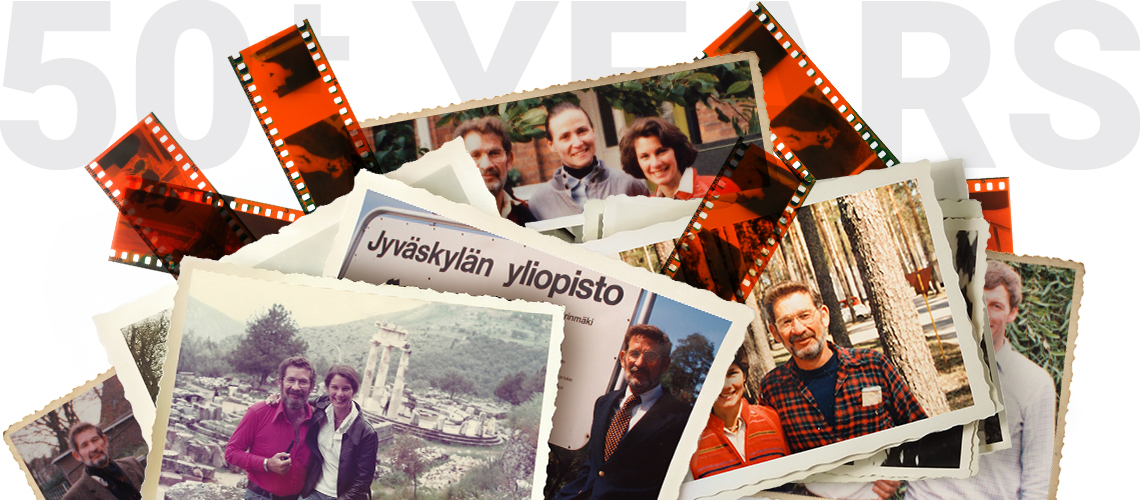

Muska taught at Rutgers University in the Department of Physical Education from 1959 to 1970 and served as chair of the department from 1963 to 1970. During that time, he changed the name and college association to the Department of Kinesiology, in the College of Arts and Sciences.
Also during the early Rutgers' years, he hired Rudy Mueller--a colleague whom he acknowledged as "my dear colleague and friend whose sensitivity and patience helped sustain me in moments of agony and joy along the road" (1972, dedication page).

Rutgers University, College Avenue Gymnasium (The Barn): Built 1930
From 1963 to 1970, Muska conceived of and participated in a CBS TV series with children in New York City called "Shape Up." Each week he would meet a new group of young children in Manhattan and introduce them to a movement concept that they would explore in different teaching styles. Muska was gentle, charming, and charismatic with children as evidenced by his fan mail. Children excitedly recognized him in town, and parents and grandparents wrote letters thanking him for producing an early morning children's program that invited thinking. Only a few of his Shape Up programs have been preserved in our library.
The genesis of the Spectrum evolved from an interaction with a student that jolted Muska into thinking differently about teaching, which in turn, lead to the development of the Spectrum of Teaching Styles in 1964. At the time, Muska was a professor at Rutgers University (Mosston and Ashworth, 1990, pp. xiii). In the preface of the 1994 text, Muska tells the story of the defining event that motivated him to investigate the Structure of Teaching.
In 1965, Muska's first book "Developmental Movement" was published. This book offers the field of physical education "an integrated concept of movement designed to achieve total physical development" (Muska believed that all fields had their own intrinsic conceptual frameworks, which like blueprints, link ideas to form a structure). Developmental Movement delineated the blueprint from which all movement is connected.
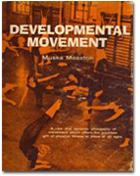
The first edition of the textbook "Teaching Physical Education" was published in 1966, and itoutlined the Spectrum theory.
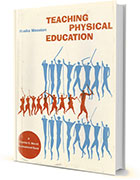
The 25-year partnership of Muska and Sara, and her commitment to the Spectrum, began with a keynote presentation by Muska at the Southeastern District Physical Education Convention in Memphis. The topic was "Inclusion in Physical Education," and in it he presented the now classic "slanty" rope concept (see Style-E for info about this concept). His ideas were novel and they focused on a range of teaching styles. The keynote emphasized one teaching style designed to include all students, independent of their ability level, by providing multiple opportunities to be engaged in the task. Such ideas about teaching had not been part of Sara's university studies. The humanity of his ideas captivated Sara, and the content of his presentation changed her life. After meeting at the conference, Sara attended every major presentation, college course, and workshop that Muska gave.
In 1970, Muska and Rudy left Rutgers to teach at East Stroudsburg University (ESU) in Pennsylvania. Muska's position was temporary so he would have time to create The Teaching Behavior Institute (TBI). Rudy and his wife, Sue, became faculty members and began developing a new pedagogical program for the PETE majors based on the Spectrum. Muska, rather than totally focusing on the development of the TBI, spent a great deal of time at ESU engaged with Spectrum teaching, working with students and faculty, giving sessions, and providing input for the new program. Teaching the Spectrum, expanding the profession's understanding of teaching behavior, and influencing the learning that occurred in the classroom were Muska's passions. Consequently, the creation of the TBI lagged.
In 1971, Sara accepted a job at the County College of Morris in Dover, New Jersey, where Muska would regularly observe her classes and offer feedback about the implementation of the Spectrum styles. These classroom observation sessions, which continued for more than a year, were not always easy for Sara as Muska pointed out discrepancies between how she thought she was teaching a particular teaching style and how she was actually teaching that style. With continuous practice and feedback from Muska, thinking about the specific decision-making patterns of both teacher and learner in the various styles became automatic. The Spectrum requires a different level of deliberate thinking about intentions, planning, implementation, and assessment. With the Spectrum as a pedagogical foundation, reflection takes on a completely different process. This increased knowledge, freedom to design, and flexibility elevated professional understanding about how to teach.
The Center on Teaching provided opportunities for Muska and Sara to expand the Spectrum beyond the field of physical education. Because the COT was available to all schools and teachers in New Jersey, they were able to apply the Spectrum to the different content fields represented in the public schools, to all ages and grades, to varying performance and economic levels, and to various labeled groups such as gifted or at-risk. Administrators studying the Spectrum found that they communicated more objectively and constructively with their teachers. They reported that when both teachers and supervisors studied the Spectrum, they shared a common language and a more congruent view about the actions and assessment of the learning intent and outcomes.
In 1972, Muska and Sara were asked to direct The Center on Teaching (COT) , funded by a Title IV C grant from the New Jersey Department of Education. The Commissioner of Education at that time focused on quality classroom teaching. In fact, every Friday he visited different schools and observed different classrooms. He had heard about the Spectrum and requested a presentation for himself and his administrative staff. After the Spectrum presentation, he directed the Department of Research and Development to initiate a grant to establish the Center on Teaching. The mission of the Center on Teaching was to improve the quality of teaching and learning in New Jersey schools. The services and program training offered to any New Jersey school was free under the auspices of this Federal grant.

During the Center on Teaching years, Muska and Sara conducted over 250 workshops. Although the Reagan administration drastically cut most of the educational grants (including the COT) in 1980, the activities of the Center continued on a freelance basis. Muska and Sara continued to present and conduct Spectrum workshops both nationally and internationally.
In 1984, the Faculty of Sport and Health Sciences at the University of Jyvaskyla in Finland bestowed an Honorary Doctorate on Muska for his work in the psychology of teaching. This international recognition and honor removed his earlier professional feelings of rejection and non-acceptance, and it reinforced Muska's belief about the Spectrum's universality.
Additional recognition and opportunity for dissemination occurred when an invitation for a three-month visit to the Scottish Center for Physical Education in Edinburgh, Scotland arrived. During their stay in Edinburgh, Peter Hill, their host and former Temple University student, invited Muska and Sara to attend an international conference in Great Britain. There, Muska and Sara met many new colleagues who invited Muska and Sara to present at their universities. The three-month visit became an 11-month European Lecture Tour. During the tour, Muska and Sara conducted 87 workshops on various topics related to the Spectrum in 11 different countries.
In addition to traveling around the world presenting the Spectrum, Muska expanded his relationship with SporTime, a successful physical education equipment company. The company's products were cutting-edge, and much of their inventory was designed to be inclusive. Muska was introduced to Barry Traub, who was SporTime's VP and traveled the world looking for innovative games and equipment that supported Muska's Spectrum philosophy. Muska and Barry shared a common philosophical view about the active development of children, and Muska created several pieces of equipment that SporTime continues to manufacture. Before Muska's passing he was entering a work relationship to give seminars and workshops sponsored by SporTime that promoted the Spectrum and the use of various SporTime equipment. Unfortunately, this collaboration was not fully established.
In 1987, Sara accepted a university job teaching the Spectrum at Florida Atlantic University to undergraduates in the Elementary Education Department. Within the first four years, Sara received every teaching award offered at the university (a total of seven awards), including the prestigious student-conducted Distinguished Teacher of the Year Award (1991). The FAU experience provided a laboratory for studying the application of the Spectrum to meet the pedagogical content needs of undergraduates. An incredible number of insights were discovered during these FAU years. During the FAU tenure, Muska and Sara continued to receive invitations and give presentations, including: Jyvaskyla, Finland; Israel; Quebec, Canada; Rome, Italy; San Juan, Puerto Rico; Crete, Greece; New Jersey, Indiana, Massachusetts, Maryland and Florida.
Muska's passing shocked the Spectrum community. He was too energetic, vivacious, and dynamic to be taken so soon. He was at a stage in his life where he was finally experiencing the acceptance of his ideas and receiving recognition from his colleagues. Indeed, his circle of friends and work obligations spanned the world. His cognitive capacities were amazing and his exuberance and zest for life were contagious.

The Faculty of Sport and Health Sciences at the University of Jyvaskyla, Finland, also confirmed an Honorary Doctorate on Sara for her work in the Psychology of Teaching and Learning. No other professional experience compares to the honor of receiving this award, and Sara was humbled to be a part of Jyvaskyla's honorary doctorate tradition.
The 5th edition of Teaching Physical Education was dedicated to Muska Mosston. It was intended to be a tribute to him, but due to an unfortunate publishing error, the 5th edition (used for several years before the error was identified) should not be used. A corrected and updated 6th edition was written in 2008 and is available free online from the Spectrum Institute for Teaching and Learning. Click here to download the 6th edition of Teaching Physical Education.
Sara was invited to be the keynote speaker at the University of West Florida, Physical Education Summer Institute to address the theme "Teaching Styles in Physical Education." In addition to the keynote, Sara conducted two 3-hour activity sessions presenting selected Spectrum teaching styles. Five UWF students assisted in this workshop presentation by designing active lessons for the participants to experience the essences of the different styles. The students' willingness to prepare and apply their Spectrum knowledge to different PE activities and their contagious energy made these multiple sessions a success. Many thanks go to Andrea, Danny, Frank, James, and Sarah. It was a joy working with them. Dr. Stu Ryan, the former chair, is a former Spectrum student of Dr. Beverly Yerg from Florida State University. Dr. John Torodorvich, the current chair and organizer of the Summer Institute, studied the Spectrum at the University of Alabama and taught at the University of Wyoming with Dr. Mark Brya, an active Spectrum Institute colleague and researcher.
Dr. Nikolaos Diglidis (University of Thessaly) organized the First International Spectrum Workshop in conjunction with the 12th European Congress of Sport Psychology (FEPSAC) in Halkidiki, Greece. The workshop focus was A REUNION AND A REVISIT of the Spectrum theory. The intent of this workshop was to gain an international perspective about the use of the Spectrum and to support international collaborative relationships. The Spectrum provided the common language for two-way conversations. A REUNION AND A REVISIT workshop was organized by Dr. Nikolaos Digelidis (University of Thessaly, Trikala, Halkidiki, Greece). Colleagues from around the world participated in this Spectrum conference.
Colleagues from across the USA and Canada converged on Buckeystown, Maryland for the first project organized by the newly created Spectrum Institute, a three-day Spectrum conference for North American physical educators. Twenty-two veteran and new generation Spectrum colleagues participated in this conference at the Institute's new center.
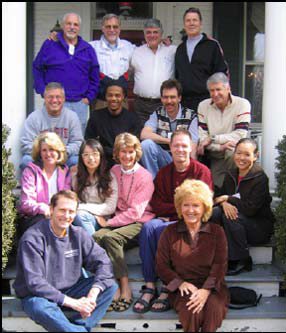
This non-profit charitable organization was established to provide a center for people from around the world to come and work together in a common commitment to improving education and schooling. The central organizing theme undergirding the Institute, the reason for the Institute's existence, is to improve education through the Spectrum of Teaching Styles. The Spectrum theory offers a repertoire of alternative teaching and learning options, from Command to Discovery, for colleagues dedicated to the improvement of classroom learning. Spectrum theory also creates a common language for dialogue that can lead to theoretically solid implementation practices, while providing a unifying structure for new ideas and for understanding change in education that can contribute to valid and cumulative progress.

The Spectrum Logo was used until 2013
This first online book on the Spectrum is now available as a free download from the Spectrum Institute. This text is a corrected version of the 5th edition (which should not be used because of publishing errors). Click here to download the 6th edition of Teaching Physical Education.
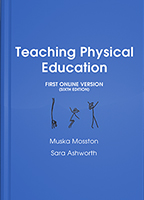
Teaching Physical Education, First Online Version, Sixth Edition
The Spectrum website advanced the opportunities for the Institute to serve as a clearinghouse for information and research about various teaching and learning styles. The information on the Spectrum site makes possible the immediate sharing of information and the opportunity to establish collaborative relationships with like-minded colleagues interested in the improvement of pedagogy.
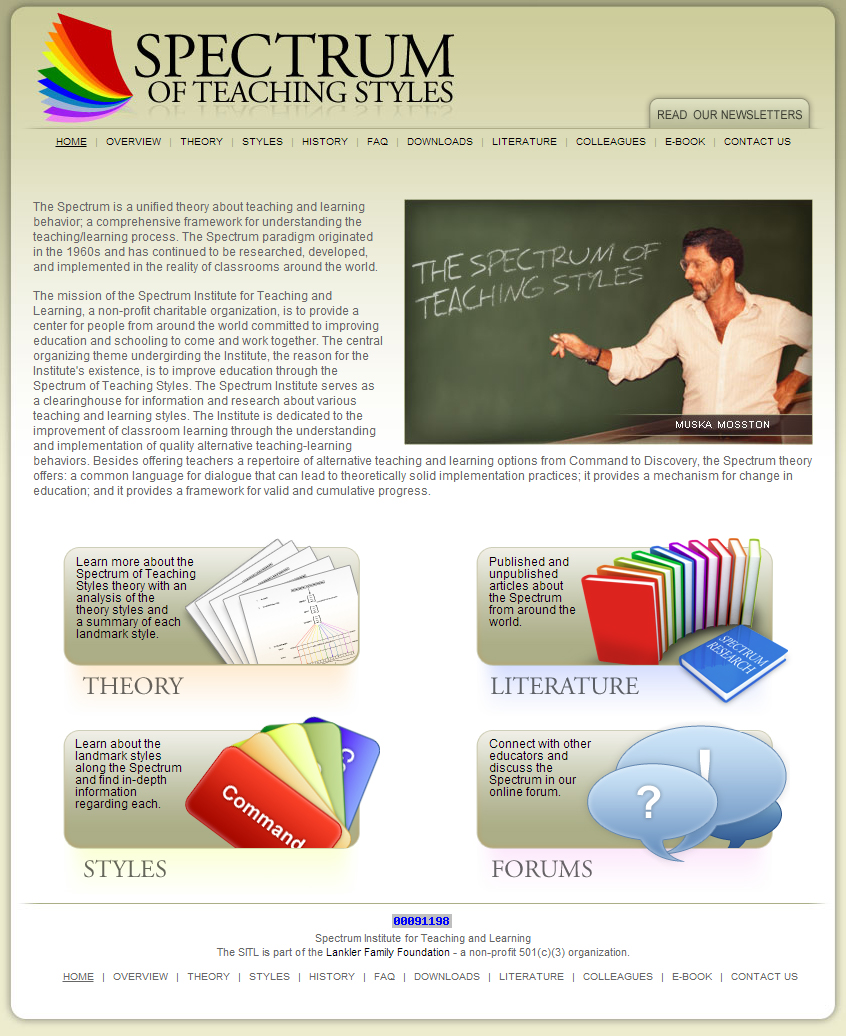
The First Spectrum Website, 2008-2013
AIESEP - Association Internationale des Ecoles Superieures d'Education Physique International (Association for Physical Education in Higher Education) held their pre-conference board meeting in Jupiter, Florida on the properties of Dr. Sara Ashworth and her husband Sandy Lankler. This location is also the site of the Florida Spectrum Institute. In spite of the relaxed environment, the board members worked long hours each day to complete their full agenda. Many AIESEP members are knowledgeable in the Spectrum. During the conference Dr. Keh Nyit Chin of National Taiwan Normal University brought a Mandarin translation of Teaching Physical Education by Dr. Hung- Shih Chou. Although this translation was completed shortly after Dr. Mosston's passing, neither Muska or Sara had seen a copy of this work. It was thrilling to see the Spectrum in Mandarin. Only the Spectrum charts were recognized!
Dr. Tom Cuddihy (Chair of the School Learning and Teaching Committee, School of Human Movement Studies, Queensland University of Technology) chaired the 26th ACHPER International Conference in Brisbane, Queensland, Australia. Approximately 500 very active and involved participants attended the conference.
All sessions in this three-day conference focused on various aspects of the Spectrum of Teaching Styles. This visit to Taiwan was extended to include three weeks for visiting various schools and universities. It was a glorious experience learning that so many universities in Taiwan are using the Spectrum. During this visit, Sara witnessed first-hand a favorite observation about the Spectrum: The Spectrum transcends cultural boundaries. Some of the universities and schools visited were: National Taiwan University, Taipei Physical Education College, National Taipei University of Education, National Taiwan Sport University, National Hsinchu University of Education, National Kaohsiung Normal University, National Taichung University of Education, National Taitung University and Minghu Primary School, Nanhu High School, Wun-Chang Elementary School, Shang Shih Elementary School, and Hsin Chu Municipal Hu Lin Primary School. Thanks to all of these learning centers for this glorious experience.
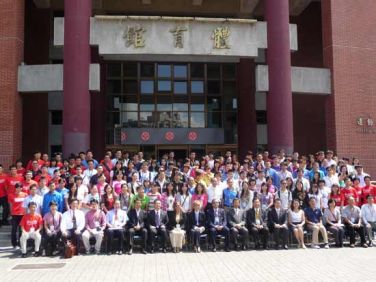
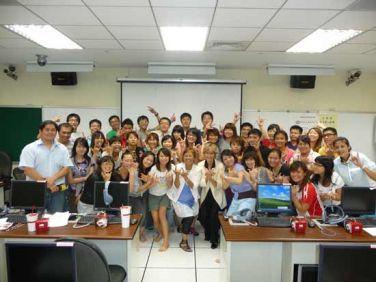
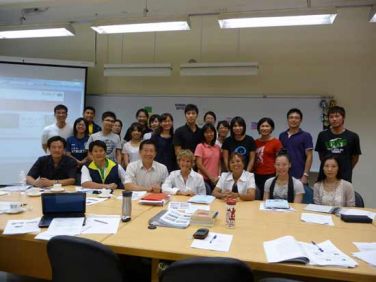
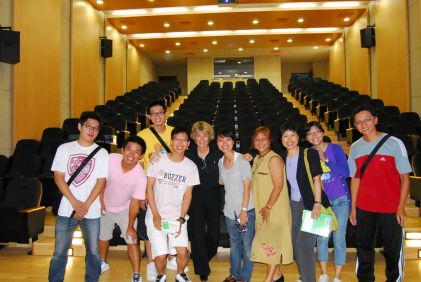
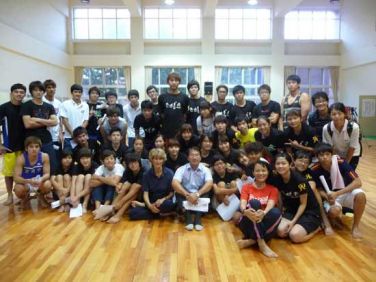
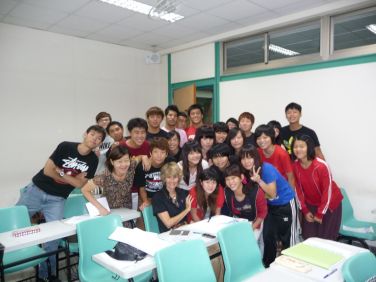
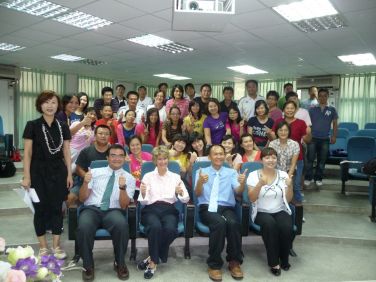
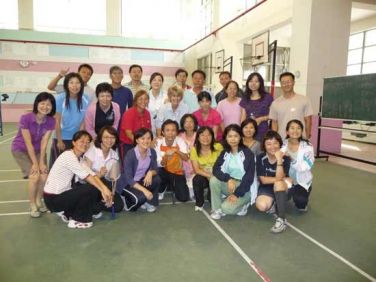
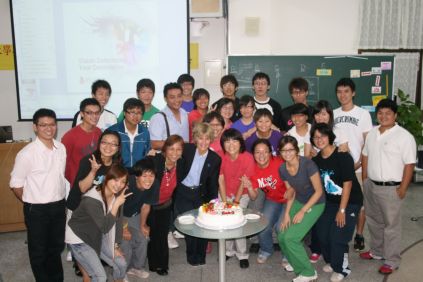
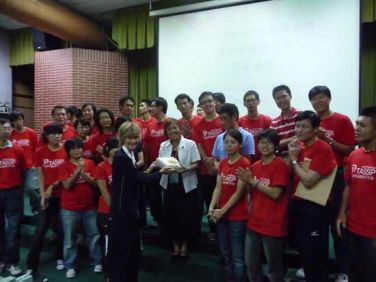
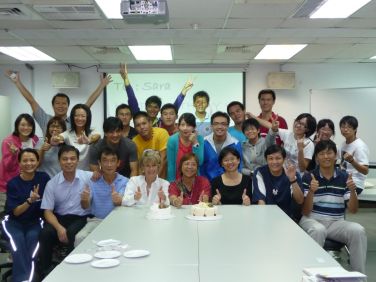
Currently, Spectrum events focus on establishing a national and international platform for the Spectrum Institute for the purpose of maintaining quality pedagogy through a common understanding and language for the theory and implementation of teaching. A common platform in no way restricts communication or ideas; instead, it expands the possibilities. Research for future developments depends upon a calm progression of ideas rather than an idiosyncratic approach, where ideas are not linked or connected. In addition to the new web site, current efforts focus on a new Spectrum text for general education.

The new look of the Spectrum of Teaching Styles Website
Sara Ashworth, founder of the Institute, reached out to Spectrum colleagues she knew and trusted to invite them to form the first board of the Spectrum Institute for Teaching and Learning. The first was comprised of: Nikolaos Digelidis (president), Deng-Yau Shy (vice president), Wei Feng-Min (vice president), Mark Byra (treasurer), and Sara Ashworth (advisor).
This year saw the debut of the SITL Research Grant and the yearly Spectrum of Teaching Styles Outstanding Journal Article Award.
On April 11th, 2022, Sara Ashworth, often called the mother of the Spectrum of Teaching Styles, passed away in her sleep at her home in Jupiter, Florida.
"Hearing from the Spectrum Experts" was the first workshop series put on by the Spectrum Institute. It consisted of five Zoom sessions where Spectrum colleagues from all over the world shared their experiences with and research into the Spectrum of Teaching Styles. To learn more about this series and/or watch the recordings go to: https://spectrumofteachingstyles.org/index.php?id=1806
This year saw the debut of two new Spectrum grants. The first was the Conference Mini-Grant where colleagues who plan on presenting about the Spectrum of Teaching Styles at an international conference could apply for a $1,000 USD grant. The second grant was the Episode Grant where the SITL offered funds for those who could submit recordings of Spectrum Teaching Styles being used in the classroom.
"Broadening the Spectrum of Teaching Styles Through Global Coalition" was the second workshop series put on by the Spectrum Institute. It consisted of five Zoom sessions where the first recipients of the SITL Research Grant were able to share their research findings along with other Spectrum colleagues sharing their work with the Spectrum.